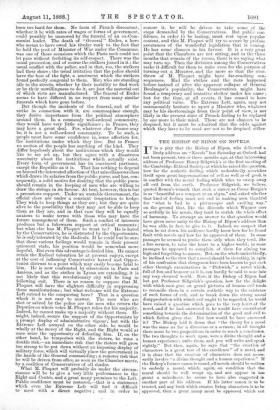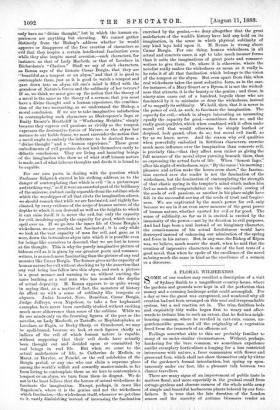THE BISHOP OF RIPON ON NOVELS.
IT is a pity that the Bishop of Ripon, who delivered a lively address on "Novels" last Saturday at Oxford, had not been present, two or three months ago, at that interesting address of Professor Henry Sidgwick's at the first meeting of the Cambridge Ethical Society, at which he raised the question, how far the aesthetic feeling, which undoubtedly nourishes itself upon great impersonations of evil as well as of good, is in conflict with the moral feeling which tries to sweep away all evil from the earth. Professor Sidgwick, we believe, quoted Renan's remark that such a career as Caesar Borgia's is as "beautiful as a tempest or an abyss," and asked whether that kind of feeling must not end in making men thankful for "what is bad in a picturesque and exciting way," on the ground that, like the discords which Wagner uses so artfully in his music, they tend to enrich the whole effect of harmony. To attempt an answer to that question would have given more unity to the Bishop of Ripon's address than he was able, in fact, to give to it. Indeed, we suspect that when he sat down, his audience hardly knew how far he found fault with novels and how far he approved of them. In some passages he seemed to praise them only when they tend, like a fine sermon, to raise the heart to a higher world; in some passages he appeared to complain of them for aiming too high and forgetting to amuse. But, on the whole undoubtedly, he inclined to the view that a novel should be elevating, in spite of his confession that clergymen have been known to put each other through examinations in " Pickwick," a novel which, full of fun and humour as it is, can hardly be said to soar into any very elevated world. Now, if the Bishop of Ripon had but put Professor Sidgwick's question, how far the delight with which men gaze on grand. pictures of human evil tends to reconcile them in a certain aesthetic way to the existence of such forms of evil, and to break down the strong moral disapprobation with which evil ought to be regarded, he would have raised a question which goes to the very heart of the novel, and if he had answered it, he would have contributed something towards the determination of the good and evil to which fiction gives rise. But how would he have answered it? The Bishop laid it down that " the theory for a novel was the same as for a discourse or a sermon ; in all thought there must be two propositions in order to reach a conclusion. The two thoughts to work upon, were a divine thought and a human experience ; unite them, and you will write and speak rightly." But then, again, he says that " the creation of characters is a great test of the excellence" of a novel, and it is clear that the creation of characters does not neces- sarily involve "a divine thought and a human experience." If the Bishop's former canon is sound, all novels should be written to embody a moral, which, again, on condition that the moral should be well wrapt up, and not appear in too gaunt a nakedness, he seems to have also suggested in another part of his address. If his latter canon is to be trusted, and any book which creates living characters is to be approved, then a great .many must be approved which not
only have no " divine thought," but in which the human ex- periences are anything but elevating. We cannot gather distinctly from the Bishop's address whether he would approve or disapprove of the free creation of characters so evil that they inspire a certain intellectual fascination even while they also inspire moral aversion,—sach characters, for instance, as that of Lady Macbeth, or that of Lovelace in Richardson's " Clarissa." Shall we say of such characters, as Renan says of the historic Caesar Borgia, that they are " beautiful as a tempest or an abyss," and that it is good to contemplate them, just as it is good to watch a tempest and gaze down into an abyss, till one's mind is filled with the grandeur of Nature's forces and the sublimity of her terrors P If so, we think we must give up the notion that the theory of a novel is the same as the theory of a sermon, that you must have a divine thought and a human experience, the combina- tion of the two warranting, as we understand the Bishop, a moral conclusion. If we are to take imaginative satisfaction in contemplating such characters as Shakespeare's Iago, or Emily Bronte's Heathcliff in " Wuthering Heights," simply because they express evil passions as vividly as the tempest expresses the destructive forces of Nature, or the abyss her menace to our feeble frame, we must surrender the notion that a novel ought .to embody the inference to be derived from a "divine thought" and a " human experience." These great embodiments of evil passions do not lend themselves easily to didactic conclusions. They are living and haunting beings of the imagination who show us of what stuff human nature is made, and of what hideous thoughts and deeds it is found to be capable.
For our own parts, in dealing with the question which Professor Sidgwick started in his striking address, as to the danger of contemplating that which is evil in a picturesque and striking way," as if it were an essential part of the brilliancy of the universe, and not easily separable from the sublime whole which the worshipper of all that rivets the imagination adores, we should remark that while we are fascinated, and rightly fas- cinated, by every evidence of the scope of human nature, of the depths to which it can descend as well as the heights to which it can raise itself, it is never the evil, but only the capacity for evil, involving equally the capacity for good, which casts a spell over us. If we go into the inner life of Caesar Borgia's wickedness, we are revolted, not fascinated ; it is only while we look at the vast capacity of man for evil, and gaze, as it were, down the bottomless abyss into which it is possible even for beings like ourselves to descend, that we are lost in terror at the thought. This is why the purely imaginative picture of hideous evil as it is given by our greatest poets and romance- writers, is so much more fascinating than the picture of any real monster like Caesar Borgia. The former gives us the capacity of human nature for evil without shocking us by the assertion that any real being has fallen into this abyss, and such a picture is a great menace and warning to us, without exciting the same loathing as a real man who has sounded the depths of actual depravity. M. Renan appears to us quite wrong in saying that, as a matter of fact, the monsters of history do affect us with a sense of sublimity like tempests or abysses. Judas Iscariot, Nero, Domitian, Caesar Borgia, Judge Jeffreys, even Napoleon, to take a few haphazard examples, have never been carefully studied.without exciting much more abhorrence than sense of the sublime. While we fix our minds only on the frowning figures of the poet or the novelist, on Lady Macbeth, or Tartuffe, or Mephistopheles, or Lovelace, or Fagin, or Becky Sharp, or Grandcourt, we may be spell-bound, because we look at such figures chiefly as indices of the evil of which human nature is capable, without supposing that their evil deeds have actually been thought out and decided upon or committed by real beings in real life. But when we come to the actual malefactors of life, to Catherine de Medicis, or Marat, or Barrere, or Fondle, or the evil celebrities of the Borgia period, or any one who can claim a supreme place among the world's selfish and cowardly master-minds, so far from loving to contemplate them as we love to contemplate a tempest or an abyss, we turn from them in disgust. We do not in the least believe that the heroes of actual wickedness do fascinate the imagination. Except, perhaps, in cases like Napoleon's, where it is the genius and not the wickedness which fascinates,—the wickedness itself, whenever we get close to at, vastly diminishing instead of increasing the fascination
exercised by the genius,—we deny altogether that the great malefactors of the world's history have laid any hold on its imagination, in the sense in which physical sublimity of any kind lays hold upon it. M. Renan is wrong about Omar Borgia. For one thing, human wickedness, in all actual and concrete cases, is apt to take much meaner forms than it suits the imaginations of great poets and romance- writers to give theM. Or, where it is otherwise, where the novelist really makes the wickedness as mean as it really is, he robs it of all that fascination which belongs to the vision of the tempest or the abyss. But even apart from this, when real wickedness takes the most seductive form, as in the case, for instance, of a Mary Stuart or a Byron, it is not the wicked- ness that attracts, it is the beauty or the genius ; and these, in ninety-nine cases out of a hundred, beguile those who are fascinated by it to minimise or deny the wickedness, instead of to magnify its sublimity. We hold, then, that it is never in the power of evil, as such, to fascinate the imagination. The capacity for evil,—which is always interesting as measuring equally the capacity for good,—sometimes does so ; and the really great qualities, which when combined with it often make moral evil that would otherwise be simply loathed or despised, look grand, often do so ; but moral evil itself, so far as we know, never. And the reason why evil qualities when powerfully embodied in fictitious characters, exercise much more influence over the imagination than concrete evil, is precisely this,—that they affect men rather as giving the full measure of the moral abyss yawning beneath them, than as expressing the actual facts of life. When "honest Iago," after his night of wickedness, says, " By the mass ! 'tis morning ; pleasure and action make the hours seem short," the fascina- tion exerted over the reader is not the fascination of the wickedness, but the fascination of contemplating the strength of that elastic spring in the tempter's mind which makes him feel as much self-congratulation on the successfu- sowing of the seeds of evil passions, as another in his place might have felt in the successful sowing of the seeds of trust and forgive- ness. We are captivated by the man's power for evil, only because we see in it an even surer measure of the great power of human nature, whether exerted for evil or for good. The sense of sublimity, so far as it is excited, is excited by the immensity of the power,—not by its devotion to evil purposes. And had Iago been a real instead of an imaginary character, the consciousness of his actual fiendishness would have destroyed instead of enhancing our admiration of the spring and force in his nature. But, in any case, the Bishop of Ripon was, we believe, much nearer the mark, when he said that the creation of impressive characters is one of the best tests of a good novel, than when he spoke of the excellence of the novel as being much the same in kind as the excellence of a sermon or a discourse.



































 Previous page
Previous page